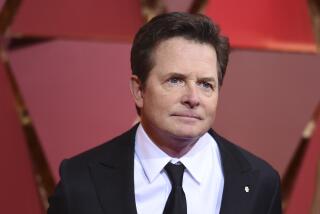He’s Still Playing Hard, but Never Fair
- Share via
You’ve probably heard of Michael J. Fox and his fight against Parkinson’s disease.
You probably haven’t heard of James W. Warsaw of Newport Beach. Too bad. He’s a guy you’d like. And if your tastes run to movie and TV stars like Fox, Warsaw bears more than a passing resemblance in look and manner to Al Pacino.
That is to say, a cool guy.
A cool guy who, like Fox, is battling Parkinson’s. And despite the upbeat attitude Warsaw, 55, has insisted on in the nine years since his diagnosis, the battle ain’t fun.
Early on, Warsaw had a choice. He could bide his time and hope for a cure -- maybe 10, 15 years -- or he could act.
Because it’s in his genes, he acted. After all, his father, David Warsaw, in 1928 convinced Philip Wrigley, son of the Chicago Cubs owner, to let him sell ashtrays inside Wrigley Field -- when he was 16. That enterprise became Sports Specialties, a Warsaw family business eventually based in Irvine and a national leader in distributing high-end sports caps for professional baseball, football and basketball teams.
In 1993, Jim Warsaw and his brother Robert sold their business to Nike and made millions. Jim Warsaw had big plans for fun and philanthropy, until he was diagnosed later that year. He soon came to learn that medical researchers often don’t compare notes and, in effect, seldom collaborate.That was a business model to make Warsaw nuts.
It certainly wasn’t how David Warsaw taught his sons to run a business or to live life. So, although retired, Jim Warsaw began thinking again like a businessman.
“Dad was always saying it’s teamwork and cooperation in business,” Warsaw says.
“When we were in business, we came up with the best idea of the three of us and we ran with it.”
When facing a disease that afflicts an estimated 1.5 million Americans, what better battle plan than to gather the best minds in the country?
Sounds obvious, but Warsaw found it just doesn’t work that way in a field dominated by ego and independence.
On Dec. 8, it happened.
Dozens of people from all sectors of the medical research world convened at a two-day conference in Chicago and agreed in principle to streamline the ways that Parkinson’s research is conducted.
James Fallon, a professor of anatomy and neurobiology at the UC Irvine Medical Center, who, with Warsaw, was one of the conference organizers, says the session was historic.
“We found a way we can sort of finesse this,” he says of the often exasperatingly lengthy timelines involved in disease research.
Warsaw, who already is showing the stooped gait and occasional speech problems associated with Parkinson’s, is girded for battle.
“I’ve seen enough evidence that it’s a doable deal,” he says. “We will get the cure to Parkinson’s. But this is not like Sports Specialties and Nike. Those were easy deals. This is a deal where there’s no cure and no known cause.”
Warsaw envisions follow-up conferences -- and a “fast-track” cure for Parkinson’s. He sees Chicago as a model for disease research. He also foresees living out a good life with his wife and three sons.
He sees all that through the prism of a businessman whose late father taught him to play hard, but fair. And above all, play to win.
“I didn’t think I’d be an advocate like I am today,” he says. “What I thought of were my sports references and analogies: I’ve got this diagnosis; I’m going to win. Every day I get up, no matter how I feel, I say I’m going to beat the heck out of this thing, one way or the other.”
*
Dana Parsons’ column appears Wednesdays, Fridays and Sundays. Readers may reach Parsons by calling (714) 966-7821 or by writing to him at The Times’ Orange County edition, 1375 Sunflower Ave., Costa Mesa, CA 92626, or by e-mail to dana.parsons@latimes.com.
More to Read
Go beyond the scoreboard
Get the latest on L.A.'s teams in the daily Sports Report newsletter.
You may occasionally receive promotional content from the Los Angeles Times.










